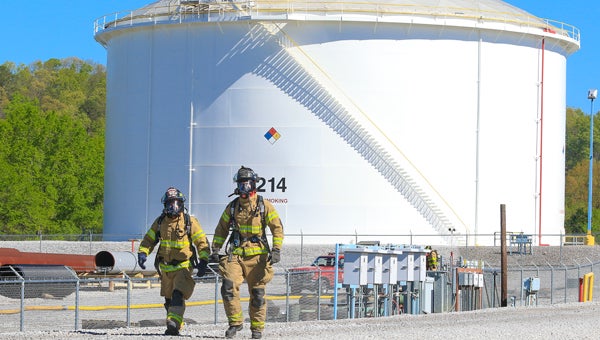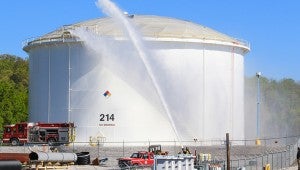Pelham responders gain experience through simulated emergency
Published 2:16 pm Thursday, April 7, 2016

The Pelham Fire Department arrives on the scene of a simulated tank overflow at Colonial Pipeline in Pelham. (For the Reporter/Dawn Harrison)
By JESSA PEASE / Staff Writer
PELHAM— Sirens sound off at the Colonial Pipeline facility in Pelham and are soon echoed by those of Pelham’s police and fire departments. Minutes later, first responders arrive on the scene of a simulated tank overflow scenario.
If this was a real situation, evacuations of the facility would begin and several fire agencies would respond to assist the Pelham Fire Department. On April 7, the main goal was to successfully execute the department’s pre-planned exercise.
“The main thing is this is real-world, we are actually going to flow water,” said Pelham Fire Chief Danny Ray. “Because of EPA regulations, we don’t typically get to flow a lot of water…to actually get the lines charged, get them all laid out and actually see some water (means) we can see how things work.”

Water flows to the top of one of Colonial Pipeline’s tanks, simulating how Pelham first responders would control a tank overflow situation. (For the Reporter/Dawn Harrison)
Ray said the department has had several pre-meetings and pre-training sessions related to this scenario, and they’ve also gone through tabletop scenarios to pre-plan the exercise.
The exercise created a scenario where all the electronics at the Colonial Pipeline site were down and the tank began to overflow. According to Communications Specialist Ryan Rogers, this situation was unlikely, but it gave first responders and the company a chance to practice in case.
Rogers said Colonial Pipeline collaborates with first responders in the entire system, which consists of 13 states. Each state hosts training modules, such as the tank overflow, two or three times a year.
“Emergencies are very rare,” Rogers said. “If they ever did happen, you wouldn’t want to be exchanging business cards with the fire fighters and policeman at the time of the incident. It’s important to have those relationships really built out.”
Because of that, Rogers said the facility is constantly in connections with the all the surrounding agencies. The collaboration goes beyond training, he added, because Colonial Pipeline also donates necessary safety equipment to the departments that may need them.
Once first responders arrived on the scene of the module, the fire engines barrelled up the hill to one of the facility’s tanks and the police set up a perimeter. Fire fighters worked to connect hoses and water started to spray into the air, clearing the top of the Colonial’s tank.
“If this was actually a real fire, we would get all this (equipment) set up, protect the exposures and then, once we’ve got that extra foam in place, we would actually extinguish (the fire),” Ray said. “We want to make sure that we can get everything set up, and then work out any kinks from there.”
Had this been a real situation, Ray said he was confident the fire department would have handled it well. After the training session, he said the department is going to conduct an after action review with Colonial Pipeline and share the lesson with other department shifts.
“Some of this is the (fire department) practicing their own things, and, of course, for us it’s how we would work together if we ever had a situation,” Rogers said. “It’s really beneficial, and the purpose of it is to protect the communities that we share our pipeline with.”









